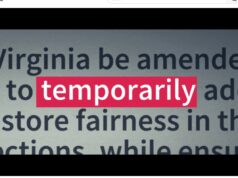We started the Virginia Progressive Legislative Alert Network (VAPLAN) last year to encourage grassroots progressive activists who’d worked so hard to elect and re-elect Democrats to the House of Delegates to keep their activism going by following the legislative session, paying attention to bills they cared about, and making their voices heard when they could. Now that the 2018 session is over, we naturally wonder, how did our legislators do? So we put together a VAPLAN scorecard–a measure of how every legislator voted on the bills we followed this session.
First, I will say that although there are other issue-specific legislative scorecards, like the one put out by Sierra Club, or the Chamber of Commerce, to my knowledge there hasn’t really ever been one that measures progressive votes across a wide variety of issue areas for all of our General Assembly members. That’s why we’re very excited to be able to develop this tool for summarizing how our Delegates and Senators voted. Of course, it’s important to remember that no ranking, no matter how carefully crafted, can perfectly measure the ideological differences between legislators.
With that…a drumroll please; without further ado, here is the first annual* VAPLAN legislative scorecard!
https://docs.google.com/spreadsheets/d/1ILLwLWx9A9fuy8zfs48bOg1VSkqmQ16vOiD_DDk5s3M/edit?usp=sharing
Perfect scores: One State Senator and one Delegate each received a perfect scorecard. Thank you to Alfonso Lopez and Jennifer Wexton, for voting the right way on every single one of the bills that VAPLAN advocated on in 2018! That’s kind of phenomenal really. But also not too surprising to me personally; after I’d been tracking bills for a while, if I got to one that I didn’t quite understand, I knew who to look to for my measuring stick to figure out whether it was a good bill or not.
The Strong Progressives (Scored at least 80%): Just a tiny bit behind were a fantastic group of legislators who voted the way we wanted on almost every bill. In the Senate, they were Jeremy McPike, Adam Ebbin, and Jennifer McClellan. In the House, they were Sam Rasoul, Lee Carter, Marcus Simon, Jennifer Carroll Foy, Kelly Convirs-Fowler, and Minority Leader David Toscano. Nice to see both the House Whip and the House Minority Leader are among the most progressive legislators in the General Assembly!
Good, Solid Progressives (Scored at least 73%): Delegates Danica Roem, Mark Levine, Elizabeth Guzman, Delores McQuinn, Kathy Tran, Debra Rodman, and Jeion Ward; Senator Mamie Locke.
Democrats Who Scored Just Barely Above the Republicans (Scored less than 40%): Delegates Stephen Heretick, Luke Torian, Matthew James, Paul Krizek, Kaye Kory, Mark Sickles, Roslyn Tyler, Lashrecse Aird, Vivian Watts, Joe Lindsey, John Bell, Jeffrey Bourne, Cliff Hayes, and Michael Mullin; Senators Rosalyn Dance, and Lionell Spruill.
The Moderate Republicans (Scored above negative 42%): Delegates Robert Thomas, Christopher Stolle, David Yancey, Chris Jones, House Speaker Kirk Cox, and Terry Austin; Senators Jill Vogel, Emmett Hanger, Glen Sturtevant, and David Suetterlein.
The Wayyyyyyy Right (Scored lower than negative 75%): Delegates Kathy Byron, Israel O’Quinn, Greg Habeeb, Matt Farriss, Margaret Ransone; Senators Bill DeSteph, Tommy Norment, Charles Carrico, Bryce Reeves, Dick Black, John Cosgrove, and Frank Ruff.
Here’s the methodology behind the scorecard. We considered any bill that we tracked for VAPLAN and sent out alerts for, or otherwise advocated for or against. The bills included
- the final budget with Medicaid expansion
- the Medicaid work requirement bill
- the civil asset forfeiture bill
- the “golf course” bill
- the grid transformation/”Dominion bill”
- the clean rate freeze repeal
- the bill banning public utility campaign donations
- “Erin’s law”
- the bill banning guns in churches
- the sanctuary city ban
- the redistricting criteria bill
- and others
A complete list is on the column headings in the Google sheet linked here and above.
A legislator scores +1 for a progressive vote, -1 for a non-progressive vote, and 0 if he/she didn’t take a vote–either because of being absent, abstaining, or more often because the vote was in a committee the legislator didn’t sit on. In all cases, the final vote on the bill, whether that takes place in a committee or on the floor, is the one we count.
Additionally, a legislator could score +1 for being a sponsor or co-sponsor on a bill that he or she did not have an opportunity to vote on. If a legislator was absent, but indicated the vote they intended to cast, the score represented the intended vote.
The legislator’s total score is the sum of all the bill scores, divided by the number of bills that he or she could have cast a vote on, so that the final score measures the percent of votes cast on these bills that were progressive. The measure ranges from 1 (all votes cast were progressive) to -1 (no progressive votes were cast).
Caveats:
- There were around 3,000 bills in the 2018 Virginia General Assembly; this analysis includes just 26. In general, VAPLAN picked bills that were straightforward enough to explain to our members; that we felt had a clear “progressive vote”; and with extra emphasis on bills that we thought might be affected by our advocacy–so we have fewer party-line vote bills or unanimous agreement bills. While this means we include fewer highly partisan bills, this actually helps us differentiate among legislators, since adding +1 to every Democrat and -1 to every Republican on party-line votes would just emphasize the D/R difference, without helping to tease out the intraparty differences.
- There is no re-weighting of the bills; each bill has the same importance and value to the total score as the rest. Although some of the bills may be more noxious than others, this was a judgement we did not want to impose on the numbers.
- There may be something of a tilt towards criminal justice and environmental bills, since those were the topics that our members were most interested in–these also were the bills where Democrats were most likely to be divided on, however.
- The decision to assign points for sponsorship and co-sponsorship of bills was difficult. We wanted to give credit for the votes legislators clearly wanted to cast, even when they didn’t have the opportunity. At the same time though, there are other differences in who co-sponsors bills. Republicans almost never co-sponsor each other’s bills, so they got very few points for that. And co-sponsoring might have to do with personalities, and who gets along well with others. On net though, we didn’t want to throw away the good information that co-sponsorships contained, so we assigned points for that. (But didn’t take away points for not doing so.)
On the whole, I think even though we’ve winnowed down 3,000+ bills to 26, for the most part, the score cards met my expectations. People I expected to be progressive were, by and large. (Senator Surovell and Delegate Sullivan were the only ones that surprised me, as both seemed to patron a large number of progressive bills. Also Delegate Kory was absent for a large number of the votes we tracked, so her score is based on a much smaller set of data, and may not be as reliable.) These results don’t quite perfectly match up with the recent (conservative) Middle Resolution PAC ratings, which are skewed by weighting Medicaid expansion and healthcare heavily. There, for example, Del. Sam Rasoul (D), who has the second most progressive score here, is ranked as one of the most conservative Democratic legislators, because he voted against budget bills containing Medciaid expansion (from the left, due to his opposition to work requirements in the bills). Similarly, Sen. Glen Sturtevant (R) is ranked as the most conservative by their measure, but is one of the least conservative Republicans here.
It would make a lot of sense to match up these rankings with “district lean” numbers, to see whether the progressive legislators are those living in progressive districts (certainly true for Delegate Lopez, but making nearby Delegates Hope and Sullivan’s scores surprising), and whether there are districts that Northam won, with excessively conservative representatives. But I’ll leave that for another post.
*You’ll notice I called this the first annual VAPLAN legislative scorecard? Yes, that’s right, VAPLAN will be in action all over again in the 2019 session. We’ll be doing more of the same, tracking bills and votes, and advocating for progressive legislation. It would be great to see a few more perfect scores next year, and a whole lot more strong progressive votes! Stay tuned.
UPDATE 2:06 pm Monday: Note that a few scores have been changed to fix an error due to the omission of SB13, the Senate twin for the House SCC intervenor bill.




![[UPDATED with Map] Report by Brandon Jarvis: VA “General Assembly Democrats have reached agreement on a 10-1 map”; “Sen. Lucas says the maps are competitive”](https://bluevirginia.us/wp-content/uploads/2026/02/shirazi101-238x178.jpg)







![Video: Rep. Suhas Subramanyam (D-VA10), Who Was in the Room for Ghislaine Maxwell Deposition, Says She Was “robotic,” “unrepentant,” a “monster [who] should be behind bars forever”](https://bluevirginia.us/wp-content/uploads/2026/02/suhas0209-100x75.jpg)